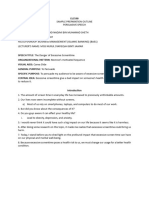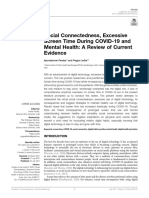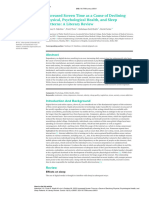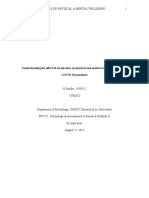NAME:-
1. SITI NURKAMALIAH MUNIRAH BINTI ABDUL MALEK (2318504)
2. MUHAMMAD AZFAR ZULHAKIM BIN MOHAD ALIAS (2318873)
TOPIC Excessive Screen Time: Harmless Pastime Or Silent Health Threat
INTRO GENERAL STATEMENT
In the contemporary digital era, the use of modern technologies is on the
rise as the devices such smartphones, laptops and tablets have become
important tools to ease daily tasks. The increase in screen use from these
devices has become an unavoidable part of our lives. Many people
dedicated countless hours to their digital devices for various purposes,
including studying, working and changing from traditional ways of doing
tasks to more accessible platforms that allow easier communication and
access to information. Not only has this brought convenience in
professional settings but it also enhanced personal life, as individuals are
now able to enjoy leisure activities through their gadgets.
HISTORICAL BACKGROUND
The rise of this screen time happened during the COVID-19 Outbreak, in
order to avoid infection, people worldwide were placed under lockdowns
and stay at home orders that restricted outdoors activities and shifted work
into the home. In this situation, technologies and gadgets became the
essential tools to fulfil both work and personal needs, as they played a vital
role in connecting people virtually and allows them to complete their tasks
from home. Beyond professional purposes, modern technology, especially
video streaming platforms had a significant rise in usage for entertainment
to relief the stress and pass the time during isolation. However, since this
outbreak happened over a long-term period, according to, Trans et al.,
(2020), it has brought about lifestyle changes that have influenced several
aspects of people quality of life. These changes not only disrupted daily
routines but also reshaped individuals’s lifestyles with enduring effects.
� DEFINITION
Screen time is a huge life changer for many people; therefore, a lot of
people take advantage of it. People often overlook that when they are
exposed to excessive screen time, it gradually affects health in subtle
ways, especially becoming a silent threat that compromises not only
physical well-being but also mental health. According to Duarte (2025),
there is increasing trend from People around the world, where they now
spend an average of six hours and forty minutes on screens every day and
since 2013, the daily screen time has gradually risen by more than thirty
minutes.
THESIS STATEMENT
Even though, constant engagement with screens does not directly harm
people but excessive screen time can expose people to consequences that
pose silent threat to their health such as persistent link to mental health
problem, bring disruptions to brain development and daily life activities
and lack of proper and safe step that can be take to avoid the overuse of
screen time.
SDG 3
This issue is closely tied to Sustainable Development Goal 3 (Good Health
and Well-being), which emphasizes the importance of ensuring healthy
lives and promoting well-being for all at all ages.
BODY TOPIC SENTENCES
PARAGRAPH 1 ● When device use becomes excessive, it can lead to serious mental
health problems and well-being.
SUPPORTING DETAILS
● It's well established that there's a link between excessive screen
time and mental health issues such as anxiety, ADHD, and
depression.
� ● Recently, the cognitive consequences of excessive tech use have
been studied as well. When we are staring at our screen, we are
constantly switching our attention between different pieces of
information, which means we are training ourselves to become
chronically distracted, reduce attention, and even slow
performance.
● Another study linked excessive digital exposure to unstable
emotion, poor self-esteem, and dissatisfaction with real life due to
constant comparisons on social media.
● Other than that, scrolling on social media without setting screen
time limits may cause sleep disruption or mental fog, which means
less sleep.
EXAMPLE
Blue light from phones that suppresses melatonin may disrupt circadian
rhythms, leading to poor sleep quality and less time for your brain to reset.
MINI CONCLUSION
● These findings show that overuse of screens quietly affects
psychological health, highlighting the hidden risks behind what
may appear to be casual usage, because the longer you ignore it,
the more control you lose.
BODY TOPIC SENTENCES
PARAGRAPH 2 Excessive screen time may interfere with the development of important
brain skills such as attention, memory, and emotional regulation.
SUPPORTING DETAILS
● Prolonged screen time use is strongly tied to ADHD symptoms,
poor emotional regulation, and frequent sleep disturbances.
● Studies show that too much screen exposure to digital devices may
slow development in verbal communication, hinder social skills
� and social intelligence, and contribute to difficulties with focus and
impulse control.
EXAMPLE
● Long-term overexposure may increase the risk of cognitive and
emotional disorders such as anxiety and depression, possibly
accelerate cognitive decline, and potentially lead to dementia.
MINI CONCLUSION
Nevertheless, excessive screen time may cause procrastination and
reduced engagement in academic performance, physical activities, and
meaningful family interaction.
BODY TOPIC SENTENCES
PARAGRAPH 3
Other than that, a further issue that contributes to excessive screen time is
the lack of effective strategies to manage and reduce this problem. When it
comes to find the precautions steps that people can apply are quite limited,
as this is considered a relatively new problem that has not yet been
addressed with sufficient research and practical solutions.
SUPPORTING DETAILS
● Unlike other health-related behaviours such as diet or exercise,
where strategies have been established over many years, screen
time is a more recent concern that gained significant attention only
after the pandemic. The absence of universally accepted guidelines
for healthy screen use makes it difficult for individuals to regulate
their device usage.
● Moreover, this issue is not widely acknowledged, as many people
believe it is avoidable and are not fully aware of its negative
effects. They often underestimate how prolonged screen exposure
can gradually harm physical health as well as affect mental
well-being. Without proper awareness, individuals may continue
unhealthy screen habits, assuming they are harmless when, in
reality, they pose long-term risks.
� EXAMPLE
● For instance, the common recommendation of limiting screen use
to less than two hours per day is not practical for many groups,
especially students and working adults who require longer hours to
complete assignments and job-related tasks.
● As a more suitable approach, individuals can develop
self-regulating habits such as scheduling screen use in the same
way they plan study sessions, setting fixed limits for each use, and
avoiding devices before bedtime. Such practices may help reduce
total screen time from exceeding eight hours or more daily.
MINI CONCLUSION
Therefore, while the use of digital devices is necessary as it influences
how we live our daily lives, it is also our responsibility to build conscious
habits and adopt proactive interventions in order to maintain a healthier
balance and prevent technology from controlling our routines.
CONCLUSION RESTATEMENT OF THE THREE MAIN IDEAS
● In conclusion, screen time is not always inherently harmful;
indeed, technology offers access to knowledge, productivity, and
entertainment after a long day of work.
● If we spend too much time on screen, it could affect our physical
strain, mental health, and emotions, and time spent bonding
face-to-face.
RECOMMENDATION
● Therefore, the solution is to set time limits on screen exposure to
improve sleep quality by at least 30 to 60 minutes.
ISLAMIC PERSPECTIVE
�● From an Islamic perspective, wasatiyyah, or balance, should be
practiced in our daily lives.
● Allah reminds the Muslim ummah as a balanced nation: "Thus We
have made you a middle nation (Ummah Wasata) so that you may
be witnesses over mankind, and the Messenger will be a witness
over you." (Surah Al-Baqarah, 2:143).

































































































